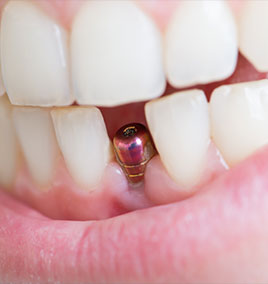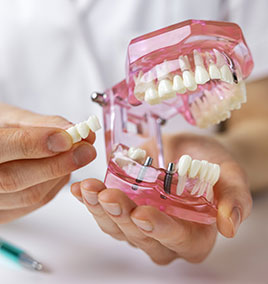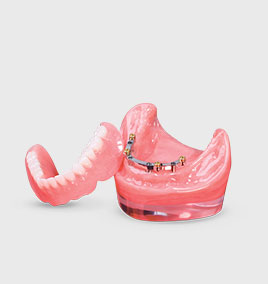EXPLAINED BY OUR EXPERT IMPLANTOLOGISTS
Understanding Dental Implants
Dental implants are used to replace a missing tooth or teeth. Most people are suitable to have implants which offer many functional and cosmetic benefits.
A dental implant is a small metal screw that is placed into the jawbone to act like an artificial tooth root. Implants are generally manufactured from titanium, a metal known to be compatible with body tissues and able to bond with adjacent bone during healing. There are also two other types of implants namely implants made entirely from zirconia and an hybrid implant made of titanium but covered in zirconia.
Zirconia implants is white rather than metallic in colour and has similar bone-bonding qualities to titanium. Zirconia implants are usually the first choice for people with a metal allergy. However, implants made entirely from zirconia tends to be more brittle and has some limitations. At our practice we prefer to offer the hybrid implant because it combines the strength of a titanium implant with the benefits of zirconia.

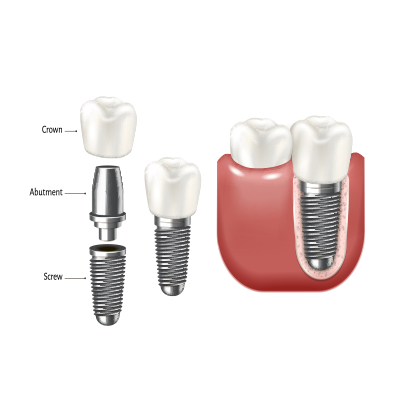
DENTAL IMPLANTS
The elements of an implant
A dental implant (screw) is inserted into a prepared bony socket in the jaw and acts as a replacement root for the missing tooth. A special attachment called the abutment is fitted to the top of the implant and forms the external connection to the replacement tooth (crown) or teeth (bridge or denture).
Once an implant has been placed in the jaw, it needs to heal before the crowns can be added. During this healing – which can take between two and six months – the surface of the implant fuses with the surrounding bone, a process known as osseointegration. Once this process is finished, the implant is stable enough to support one or more false tooth (crown).
In certain cases, where the conditions are favourable, implants can be placed immediately into the extraction socket. This type of treatment is called immediate implant placement and has the same success rates as delayed implant placement.
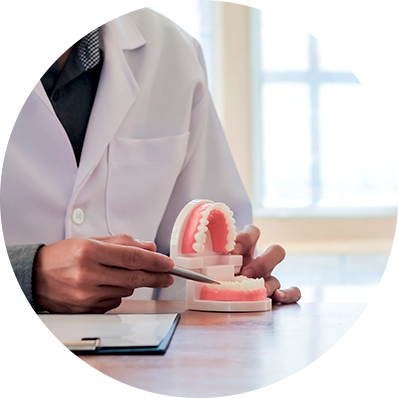
DENTAL IMPLANTS
Who is not suitable for an implant?
• Children and Teens – a young person’s jaw continues to develop until about age 16-17 years for girls and 18-19 years for boys. Until that time, placing a dental implant could disrupt normal jaw growth and interfere with the growth of the adult teeth into their normal position. If a young person loses a permanent tooth, there are many other treatment options available until they are old enough for implants. Our Dentists will be happy to provide more information should you need further advice.
• Smokers and tabacco Chewers – although it is not contraindicated to place implants for people who smoke cigarettes, cigars, or pipes or who chew smokeless tobacco it is associated with a higher failure rate. The chemicals in these products inhibits the body’s ability to heal. Research has shown that smoking significantly increases the probability of implant failure. Our dentists always advice people to stop smoking before making such a significant investment in their mouth.
• People who don’t take care of their teeth – poor oral hygiene accounts for a large number of missing adult teeth. Ironically, dental implants are designed to replace missing teeth but if a patient has lost teeth due to poor care and has not demonstrated an ongoing commitment to improve their oral hygiene, then they may not qualify for the procedure. Implant failure and peri-implantitis are significantly increased in cases of poor oral hygiene.
• The very elderly (with some exceptions) – implants are an ideal solution to older people who have lost teeth or want to replace dentures. However, in general, patients over the age of 85 may not be ideal candidates. This is due to the very elderly tending to have more chronic illnesses that could interfere with the healing process. It should be noted, that if an elderly patient is in very good health, has no outstanding issues that might interfere in the surgical procedure, and have a strong interest in receiving implants, the implant process may be recommended.
Dental Implant Process
Let Us Walk You Through the Implant Procedure
1. Free Consultation
A 15-minute chat, free of charge with no obligation to proceed. You will get a general overview of dental implants and we will answer any preliminary questions you may have. Our dentist will outline your potential treatment pathways, typical timescales and likely fees.
What is not included during this consultation:
• Specific advice requiring clinical knowledge of your condition
• Any in-depth clinical assessments, scans or X-rays
• Any diagnosis, specific treatment options
• Any case-specific timeline or free details
2. Planning Stage
An 1-hour appointment which includes the following:
• Comprehensive dental examination and diagnosis
• Clinical photos
• OPG (full mouth 2D X-ray)
• CBCT Scan (3D X-ray)
• In-depth discussion of your case with the dentist.
• Written treatment plan with a specific estimate of timings & costings (received within 7 days) and consent forms.
3. Surgical Stage
This phase includes extractions and placement of implant with or without bone grafting...
This will be performed under local anaesthetic with or without conscious sedation.
In most cases there will be a healing time after the extraction before implants can be placed.
4. Restoration Stage
This is when the false tooth/teeth will be added to the implant(s) over two visits.
At your first visit, you will have a 3D intra-oral scan (digital impression) to verify the position of the implant and the shape of the gum.
This will be send off to the dental laboratory to manufacture you a custom made tooth.
At your second visit, the permanent false tooth/teeth will be attached to your implant(s).
You will be seen again after 6 weeks for a final follow up.
5. Maintenance Stage
It is important that the dental implant and surrounding gums are kept clean. You will be given oral hygiene instructions and will need to visit the dentist and/or hygienist regularly in order to keep your dental implant(s) in good condition
Dental Implant FAQ
A dental implant ’tooth’ is made up of three main components: firstly, a small titanium screw that is inserted into and fuses with the jawbone; secondly, a post which attaches to the screw; and thirdly, a crown that fits over the post to provide a natural looking tooth that functions well.
Dental implants can be used to replace an individual tooth, or a full set of teeth, both to the top and/or the bottom of your mouth.
This is a question we often get asked, and we can assure you that we have never had a patient tell us that their dental implant treatment was painful.
There may be some inevitable discomfort afterwards, just as you may experience with a tooth extraction, but over-the-counter painkillers such as Ibuprofen or Paracetamol for a day or two after treatment is enough for most patients.
The teeth are made out of a white material, which can be either a glass ceramic or zirconia. Our implants are made from titanium which is clinically proven to fuse with the jaw bone.
Medical health seems to be more of a factor than age in dental implant patients. If you are healthy enough to have a tooth extraction, you will probably be healthy enough to receive dental implants.
You care for your implants in just the same way as you would your natural teeth. You will therefore need to continue going to dentist and hygienist check-ups regularly.
Your new teeth will look and feel like your natural teeth.
Generally there are no open wounds with implant surgery so healing is quite quick and un-eventful. You can expect some minor discomfort, but that can generally be managed with non-steroidal anti-inflammatory medication such as ibuprofen or similar medication in prescription strength.
You might be surprised to know that the average cost of an implant to the consumer has not increased significantly over the last 20 years.
This means that implants have become more affordable if you take inflation into account.
Compared to other dental treatment, implants may seem expensive. However, on average you should be able to get 15-20 years or longer of use out of your implant(s) (Conditions apply).
Not all implants are created equal. We only use premium implants, made in Germany, France & Switzerland. These implants have been scientifically proven to be safe and work as intended according to strict European guidelines. They use the latest cutting edge technology.
The implants that we use, come from large established companies with a proven track record with after sale guarantees and component availability.
Some patients are concerned about putting metal in their mouths. Zirconia implants offer an excellent metal-free option. Although zirconia implants have many benefits, it also have limitations:
• These implants are more delicate & brittle and the long term performance & success have not been proven. Whereas titanium implants have been around for longer and has decades of evidence proving its durability and success rate. Although evidence is limited, zirconia implants may have higher failure rates compared to titanium - the failure rate of titanium implants is thought to be significantly lower than that of zirconia implants.
• Over time, the material can deteriorate and lead to tiny cracks.
• The material is typically only available in one-piece implants. If a patient needs a two-piece implant, which uses an angled abutment to correct alignment, they may need to choose a metal option. Titanium implants can come in two-piece varieties, which is helpful if angled implants are needed to correct your implant positioning.
• If a patient will need any adjustment following the fitting of the implant, they should avoid zirconia, as any grinding on the surface of the implant can weaken its fracture resistance.
We offer an implant that combines both the technical advantages of a titanium implant with the tissue friendly properties of a zirconia implant. The myplant bio implant & abutment is made of titanium but encased in a strong, compatible ceramic layer. If you would like to find out more information on this implant please feel free to contact our friendly staff or follow the link above.
Book Your Free Consultation.
A Perfect Fit
Werner Slabbert and Jon Dolding describe how a simple, accurate and stable full arch implant-supported prosthesis changed a patient’s life overnight
